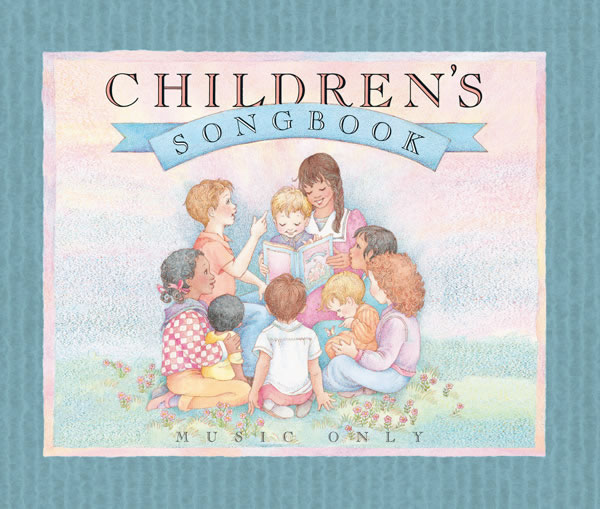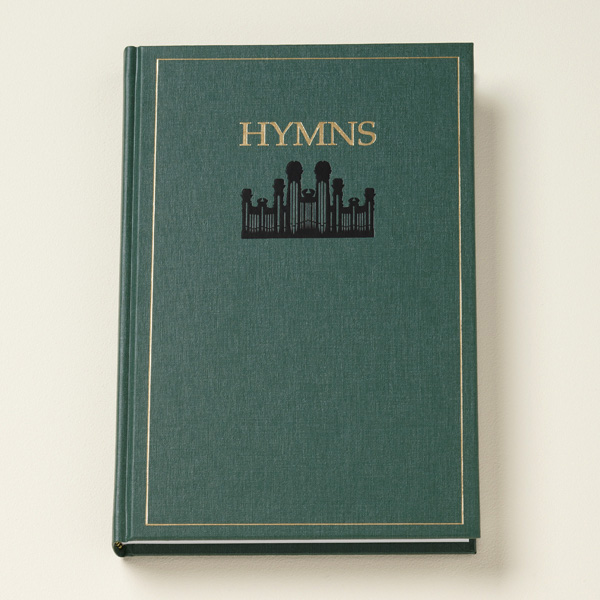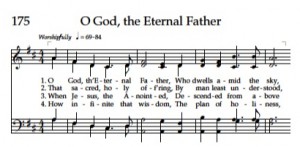This Sunday in sacrament meeting we sang the hymn O God, the Eternal Father. I noticed this time, more than previous times, the gender-exclusive language:
That sacred, holy off’ring,
By man least understood…With no apparent beauty,
That man should him desire…To walk upon his footstool
And be like man, almost…
I understand that when W.W. Phelps wrote these lyrics back in the 1830’s, gender-exclusive language was the norm, it was the way people talked, wrote, and thought. I also understand that in many instances such gender-exclusive language was typically understood to mean both men and women. I suspect that Brother Phelps had no overt desire to leave anyone out; by using “man” he may have been simply using the default term for the word “humans”.
Now, one might ask that if the word man is commonly understood to mean both men and women, then what is the big deal about continuing with this traditional language?
Here’s the big deal:
Research has shown that terms such as “he” or “his” are not interpreted generically, but rather tend to evoke masculine referents. In addition, man-linked words (e.g., man, mankind, chairman, etc.) are not perceived as referring equally to men and women. Importantly, such usage can limit the opportunities and affect the self-concept of women, leading to a lower sense of belonging and less motivation in an organizational context. In short, gender-exclusive language affects the way that men view women and the way that women view women, typically placing women in a subordinate, one-down, less-than position relative to men.
There is no disputing that some Mormon women experience alienation from their faith community simply because they are women–their gender acting as a barrier to full inclusion in church participation and full recognition in the eyes of God–and I think it is reasonable to conclude that gender-exclusive language has a tendency, or at least the potential, to contribute to this alienation.

So if gender-exclusive language negatively impacts how we all view women in the Church, it behooves us to strive for better gender-inclusion in our language. Promisingly, the rhetoric in General Conference seems to be slowly moving toward such language.
But can gender-inclusive language work in our hymnbooks? Clearly there is a need for it. Furthermore, the history of LDS hymnbooks has also shown a movement towards increased sensitivity towards women and minorities. Yet, one might object, many of the hymns are traditional, the rhyme-scheme is already set, and changes have the potential to make them less beautiful and possibly just strange.
Perhaps. But there are numerous precedents for changing LDS songs that we should consider. I will describe two of them that I noticed myself, the first, which makes what is left of my hair stand on end, and the second, which seems necessary and good.

First, one of my favorite Primary songs used to be titled, “Genealogy, I Am Doing It”, but The Committee for Removing Charm from Primary Songs in Order to Improve Correlation with Church Programs gave it the current title: “Family History, I Am Doing It”. I am not a fan–I still play from my pre-correlated Primary songbook as a mild form of rebellion–but it was done, so there is a precedent.
Second, in the pre-1985 hymnbook the chorus of the hymn, “How Firm a Foundation” used to be, “You who unto Jesus for refuge hath fled,” which sounds fine until you put it with the music and repeat it:
You who unto Jesus, you who unto Jesus, you who unto Jesus for refuge hath fled.
You-hoo! Jesus! Over here!
You can see the problem. So in the 1985 hymnbook it was changed to: “Who unto the Savior for refuge hath fled.” Good call–I can get on board with that change.
While these are two examples I noticed personally, a number of other examples are provided by Douglas Campbell in his wonderful and detailed Dialogue article from 1995: “Sons of God, children of a King” was changed to “Sons and daughters, children of a King”; “Go Forth, My Son” was changed to “Go Forth with Faith”; “…turn the heart of the fathers to the children…” was changed to “…turn your hearts toward your parents…”; and so on. He goes on to chronicle creative and elegant strategies that have been employed in the past to make the hymns more gender-inclusive.
Which simply demonstrates that there is no reason we can’t continue modifying the hymnbook if there is an acknowledged need to do so. And I would say that there is a need to do so. So many Church policies and practices treat women as being invisible–kind of like that old cliche, “Everyone is invited to the meeting, and women can come too.” According to some conceptions of modern Mormonism, Heavenly Father, like Mitt Romney, has binders full of women–a gender rolodex, if you will. It is about time we call women up and invite them to full participation in Mormonism.

Changing the next edition of the hymnbook to be more gender-inclusive would be a small but important step in that direction, and I could see most Mormons, and perhaps most Mormon leaders, being supportive of such changes. A modified hymnbook would not require doctrinal changes, but the impact would be huge because everyone would notice it–we would sing the changes each week, with even bass and tenor voices echoing the inclusiveness. It would be a powerful but subtle statement acknowledging that we have heard women’s voices telling us that some women feel excluded, and that we have taken some steps to better include them. As a move for the Church, it would seem to be low cost and high reward.
I have been told that the Music Committee made a series of additional suggestions for improving gender inclusivity in the 1985 hymnbook, but these were turned down by the General Authorities. Now here we are, nearly 30 years later, and surely a better understanding of the importance of gender-inclusive language has permeated even our Mormon consciousness.
We have been told by church leaders that women are incredible. If this is so, then it is time to demonstrate it through actions, including through changes to our hymnbook. Apparently we love women because of their special natures and abilities. Well then, in the immortal words of Eliza Doolittle:
Don’t talk of stars burning above
If you’re in love show me
Tell me no dreams filled with desire
If you’re on fire show me…Say one more word and I’ll scream…
Please don’t [mans]”expl’ine”, show me, show me
Don’t wait until wrinkles and lines
Pop out all over my brow
Show me now

I fervently hope for inclusive language in the LDS hymnal, and I’m glad to see it getting some attention in the bloggernacle. You’ve made a great case for it, Mike C.
A few years ago I wrote something about this for Exponent II, and gave some examples from Protestant traditions of how hymns can be gracefully revised to reflect inclusive language (see page 20):
http://www.exponentii.org/wp-content/uploads/2011/12/winter-2011-corrected-12-13-01.pdf
Great post, Mike! I didn’t realize that our hymns had already been tinkered with in such ways. That’s very encouraging. If, however, we only have a new hymnbook every few decades, and we’re always a step or 50 slower than anyone around us to make positive changes, I worry that the hypothetical new hymnbook will be like the new temple movie. It may not include gender-neutral language changes because even though it’s decades too late for most of us, it might still be decades too early for some of the GAs.
While we’re wishing…get rid of “Book of Mormon Stories” from the Children’s Songbook.
I think the problem may be that hymns have to demonstrate years of faithful support to the correlated hymnbook before they would even be considered for full inclusion in any new edition. This would naturally select against hymns I’ve completely made up that don’t fit the pattern of an institutionalized hymn, such as “Invite the Agnostic to the Feast,” “God Loves Us So S/He sent Her/His Son,” and any hymn title ending with “…in the Bathtub.”
This is just a thought experiment, but I wonder what would happen if all the older hymns died in a strange, Gutenbergian plague, and we had to start from scratch. Maybe we could get more works from Eric Whitacre, like Lux Aurumque. (https://www.youtube.com/watch?v=D7o7BrlbaDs)
I can dream.
Wow. Please bless that Mike C. is having a prophetic experience here. . . After all “the testimony of Christ is the Spirit of Prophecy.” You have a testimony, right? Right?
Like pretty much everything Lavina does, this is thoughtful, wise, and gracefully written, and stands the test of time. I think it’s still the definitive consideration of why we need inclusive language in our Church: http://signaturebookslibrary.org/?p=1336
An assessment that stylistically at least the hymnbook is alreadt too much hers (http://www.ijmsonline.org/archives/3241).
Perhaps what we need are marching hymns about warrior women to fill the gaps?
But yes, more gender inclusive language would be great.
Interesting address given when the new CofChrist hymnbook was introduced last year (http://www.cofchrist.org/hymnal/articles/Bell.asp). One of the patheos mormon blogs wrote about it, I forget which. But if you look at the accompanying pdf there’s a hymn entiteld there’s a line of women on p10, the words of which are quite lovely.
I’ve been routinely changing the words as I sing for years, I make it a sort of game. The hymn that you mention first is actually one of the easiest to change on the fly — by us least understood. Man isn’t part of the rhyme, you just need a single syllable signifier. Now it isn’t maybe as graceful and a true poet would do something better. Similarly brother can often be another — Savior I would love another as I know thou lovest me. Or all others? Anyway, I make a game of it. The changes are long, long overdue.
My mom served a part time mission for many years rewriting hymnal music to fit the poetic translations for languages worldwide. So not only were words changed, music was changed to fit new words. Where there’s a will and a brilliant OCD musician, there’s a way ;).
“Where there’s a will and a brilliant OCD musician, there’s a way ;).”
When I was avoiding studying for the bar exam, I went through the entire LDS hymnal (in English) and fixed it up to make it gender neutral. I changed some stuff that I found personally annoying or false doctrine as well while I was at it. I even made it into a pdf file. I keep meaning to put it on the internet, but I haven’t done it yet. Maybe I should share it. Most hymns didn’t need any changes, which pleasantly surprised me, and many of them only needed minor changes. I sing my versions in church.
Mike, I have been longing for this same change for decades and we’re about due for an updated hymnal anyway.
Trudy, please share your gender neutral hymn revisions. I occasionally substitute and would like to try your versions out.
Thanks everyone for the great comments!
Emily U, I loved your Exponent article! I think my post would have been even better if it were just one line: “What Emily said.” Makes me glad that this month we are scheduled to receive our first print edition of The Exponent. That way I won’t miss great stuff like your article!
Ziff, I also worry that, “It may not include gender-neutral language changes because even though it’s decades too late for most of us, it might still be decades too early for some of the GAs.”
Andrew C, I don’t even know what to say. You’ve left me speechless.
Melody, my last prophecy was the Packers going to the Super Bowl, so I’m not sure you can count on me in this instance, but here’s to hoping!
Kristine, the chapter by Lavina in Women and Authority was one of my favorites for sure. Thanks for the reminder.
Hedgehog, thanks for the links!
Seems like we’re all on the same wavelength. Does anyone know if a new hymnbook is in the works?